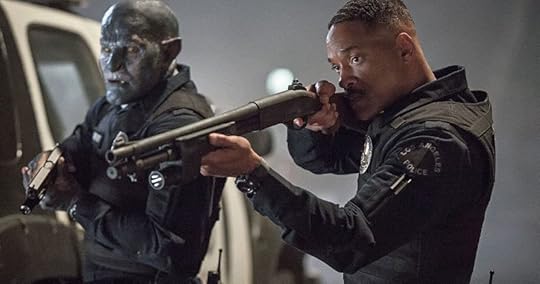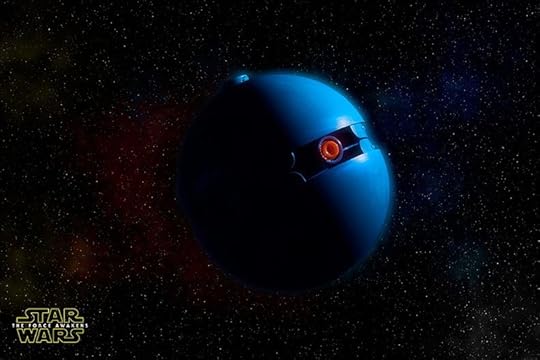Bright, Starkiller Base, and why movies get things wrong
There’s a great piece over at Polygon about the recent Netflix film Bright – the Will Smith movie about orcs and wizards and elves in modern day Los Angeles which everybody hated the passion of a thousand fiery sons. Well, I say everybody: critics despised it, but judging by the audience scores on sites like Rotten Tomatoes, fans rather liked it, because this 2018 and fuck informed opinions, amirite bro?!?!
Anyway, the Polygon story isn’t about how terrible Bright is. It’s about how ambitious the concept behind it was, and what its creators dreamt for it. Writer Max Landis – he of the fantastic Dirk Gently TV series – tweeted in 2015 that in Bright, he’d written his Star Wars, created a concept that would endure long beyond its original movie. The piece on Polygon dissects that in the wake of the movie’s release, coming to the following conclusions: 1) It’s not, 2) Landis was being a bit silly, and 3) not even Will Smith was going to make it so.
Among other things, the story points out that the way the world of Bright was constructed, with all sorts of magical beings operating inside present-day Los Angeles, and with an entire history of existence on this planet going back thousands upon thousands of years, simply couldn’t happen. Not just in the sense that orcs don’t exist, but that a present-day Los Angeles with a recognisable LAPD and Mexican gangsters and the like simply wouldn’t happen. For one thing, if there really was magic dating back many centuries, then Christianity as we know it wouldn’t have existed. That means that the Catholic Church wouldn’t have had nearly the same amount of power, which means that the Spanish may not have been the ones to conquer Central America (if it was even conquered all) which means no Latinos in America (if America even exists anymore) which means no hardcore Mexican gangbangers. No way Jose.
It’s one of those points that makes you tilt your head and go: “Huh.”

I’ve been thinking about this a lot recently – not just the fact that the movie was trash, which for the record, it very much was. In fact, I’d go further and say it is one of the worst things I’ve ever seen, a movie which managed to be both deeply intense and very, very boring. No, what I’ve been thinking about is the fact that the movie’s lore and backstory just didn’t work, on any level, not even on the Christianity–Catholic Church–Mexican gangster thing I mentioned earlier – and it got made anyway.
That is one of the most enduringly weird things about movies – all movies, in all eras. The back story, wider plot ramifications, worldbuilding and such often don’t make any kind of sense. And this goes for everything, from tiny, low-budget indie films to massive Hollywood blockbusters. Plot holes are left uncovered, gaping questions left unanswered, the laws of physics not just broken but smashed repeatedly into each other.
Think I’m exaggerating? Star Wars: The Force Awakens. They’ve got this second Death Star thing that is so big it has whole forests growing on its surface. It fires its giant killer laser beams by sucking in the energy from a nearby star, wiping it out of space. Which sounds very cool, but begs the rather obvious question: what then? What happens to the forests? The gravity? And what does the Starkiller Base do next? To get it to another star, which it presumably needs to do, you’d need it to travel at the speed of light – can you even do that with an entire planet?
This isn’t nitpicking. These aren’t tiny points. This is something that occurred to me in the cinema, while I was watching the film. It renders the entire concept of the base ridiculous. It was as if the filmmakers got a cool idea – because make no mistake, Starkiller Base is a cool idea – and never actually stopped to interrogate it, ploughing ahead without any thought as to how it might yank fans out of the movie.

What I’m going to say next is going to come off as a little bit indignant and self-righteous, and I swear that’s not what I’m going for. But here’s the thing: if I tried to pull that shit in any of the books I write, I wouldn’t even get past my initial readers. Every single one of them would just laugh in my face – they do that anyway, because I’m their mate, and we make a game out of giving each other hell, but here, they’d have a good reason. Ditto for just about every other novelist on the planet; even if they, for some reason, didn’t catch an egregious plot error, their editors almost certainly would. The editorial notes I get back from Orbit’s Anna Jackson on the manuscripts I sent her are incisive, clearheaded, and often absolutely brutal, as are those from my agent Ed Wilson. The chances of Anna, or Ed, letting something like Starkiller Base sneak into one of my books are between zero and oh hell no. I’m pretty sure I speak for other writers when I say that their editors are exactly the same.
So what gives? Why are novelists being held to a much higher standard than Hollywood filmmakers? It’s not just because the bigger the budget, more leeway you get, and the less likely you are to be questioned – any first-time director will tell you that interference and notes from studios are ubiquitous. So how come JJ Abrams is allowed to sneak in Starkiller Base, and I’m not?
Part of the reason it happens, I think, is that there are so many more people involved in the movie, and so many more moving parts. With a book, the only real moving parts, in terms of those actually making the decisions about what happens in the finished product, are me and my editor. Yes, I might have to move heaven and earth to make something work, but I only have to consult with one person about it, and don’t have to call in teams of unionised carpenters, set directors and props specialists to make it happen.
That, unfortunately, is the reality of moviemaking. You’re producing a giant thing on a fixed budget, dealing with a zillion different people every single day, and you have to get it all working in some kind of unified order if you’re ever going to come out in the black. As a result, there is not often enough time to pay attention to things like plot holes or world building, because there are so many other elements to deal with. It doesn’t excuse the often ridiculous plot points in movies, but I think this goes some way to explaining why they exist in the first place.
And the thing is, a lot of the time, this is fine. It doesn’t actually ruin the experience, as the millions and millions of people who saw and enjoyed Star Wars: The Force Awakens (and indeed Bright) will tell you. It’s a lot easier to buy into the world of the movie then it is to buy into the world of a book: the first is unfolding in front of you, presenting you with thousands of visual cues to help your imagination, whereas a book demands quite a bit more. I’m not saying that either is better, just that watching a movie or playing a videogame tends to make you a lot more forgiving. And funnily enough, I can illustrate this with another Max Landis product, the aforementioned Dirk Gently series, based on the Douglas Adams books.
The series is absolutely riddled with plotholes, mostly because it makes the mistake of involving time travel (this isn’t a spoiler – it is evident from ten minutes into the first episode). Time travel is the Great No, the big thing that is impossible to do right – not even Looper, a spectacular film in its own right, managed to resolve all the paradoxes. And yet, it was easy to forgive in Dirk Gently, because it was so much fun to watch.
Yes, the things happening on screen were vastly improbable, but the twisty plot, fantastic characters and killer performances meant that it didn’t matter. Nix (wife) and I binged both seasons in about three days straight. So yes, it’s annoying that movies aren’t held to the same standard as books, but they’ve got to be judged a little differently.
What about you? What book/movie plotholes pulled you out of the story? Which ones have you forgiven in the past? Let me know in the comments below.
Image: Starkiller Base by the_jetboy, CC licence

OUTER EARTH: THE COMPLETE TRILOGY
Dropping 6 Feb 2018 – Orbit Books
This new edition of the OUTER EARTH series contains three adrenaline-fuelled novels: Tracer, Zero-G and Impact.
Outer Earth is a huge space station orbiting the ruins of our planet.
Dirty, overcrowded and inescapable, it’s humanity’s last refuge . . . and possibly its final resting place. There are dark forces at work on the station who are seeking to unleash chaos. And if they succeed, there will be nowhere left to run.
‘FAST, EXHILARATING, AND UNFORGETTABLE. ONCE YOU START, YOU CAN’T STOP.’ Sarah Lotz, author of The Three
‘RELENTLESSLY FAST PACE…VIVID ACTION SCENES’ SFX
‘EXHILARATING. GUARANTEED TO KEEP YOU HOOKED TO THE VERY LAST PAGE’ Glamour
PREORDER NOW:
Amazon
Barnes and Noble
Book Depository
IndieBound
Google Play
iBooks
Kobo
Waterstones
Indigo Chapters
(Don’t see your favourite store here? Let me know, and I’ll add it!)



